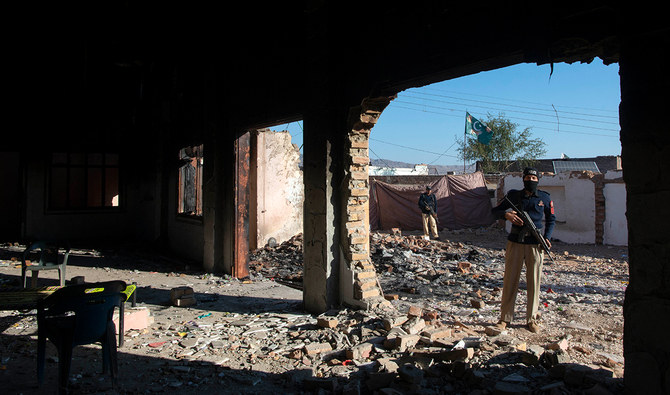ISLAMABAD: Pakistan recorded 432 fatalities as its Balochistan and Khyber Pakthunkhwa (KP) provinces bored the brunt of renewed militant violence in the last three months, an Islamabad-based think-tank said on Monday.
The 432 violence-linked fatalities among civilians, security personnel, and outlaws resulted from as many as 245 incidents of militant attacks and counter-terrorism operations. These included 281 civilians and security forces personnel, the Center for Research and Security Studies (CRSS) said in its report for the first quarter of 2024.
“The northwestern Khyber Pakhtunkhwa (KP) and the southwestern Balochistan provinces — both bordering Afghanistan, accounted for over 92 percent of all fatalities and 86 percent of attacks (including incidents of terrorism and security forces operations) during this period,” the report read.
“Individually, the former suffered 51 percent and the latter 41 percent of all fatalities in Q1, 2024.”
In addition to the casualties, there were 64 incidents of sabotage across the country targeting properties of the government, politicians, individuals, and security agencies, according to the report.
Balochistan recorded a staggering 96 percent surge in violence, with the number of fatalities jumping to 178 from 91 in Q4 2023. The Sindh province also saw a nearly 47 percent rise in violence though the number of fatalities was very low. However, the regions of KP, Punjab, and Gilgit-Baltistan (GB) recorded encouraging decreases in violence by 24 percent, 85 percent, and 65 percent respectively.
Despite a notable decrease in violence in GB during this period, the GB home minister issued a threat alert on March 31 regarding the possibility of attacks by the banned Tehreek-e-Taliban Pakistan (TTP), the report noted. The alert came following a suicide attack on a convoy of Chinese engineers in the Shangla district, resulting in the deaths of five Chinese nationals and their Pakistani driver.
“In Q1 2024, civilians and security forces personnel suffered over 65 percent (281) of all fatalities in nearly 200 terror attacks, compared to outlaws suffering only 35 percent (151) in around 48 counter-terror operations,” the report read.
“The attacks on security officials and civilians outnumbered the security operations conducted against the outlaws, by almost fourfold. Moreover, civilians bore the heaviest brunt of violence suffering 154 fatalities (36 percent) which is more than any other category of victims, and thus emerging as primary victims of violence in this period.”
The report comes amid a surge in militancy in Pakistan’s western regions that border Afghanistan. Violence initially picked up after the Pakistani Taliban called off their fragile, months-long truce in Nov. 2022.
In the last more than a year, the country has witnessed several attacks claimed by religiously motivated and separatist militant groups, with Islamabad accusing Kabul of providing sanctuaries to some of these outfits.
The Afghan Taliban government insists it doesn’t allow anyone to use Afghan soil for violence against any country.
















